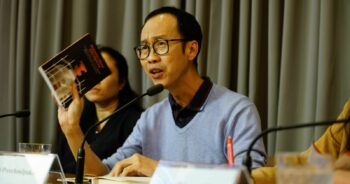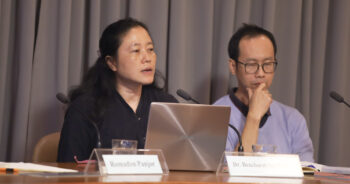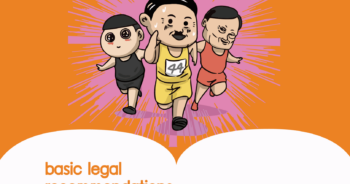To all who cherish and desire democracy
Coup in 2014
The coup in 2014 had a profound impact on Thai society and people. At the time, the coup took away the opportunity for Thai society to peacefully progress towards democracy.
Although many citizens demanded and expressed their desire for change, they were instead subjected to severe and widespread repression.
Today we commemorate a decade of this coup.
This is not a “coming together” to celebrate these events. On the contrary, this is a gathering for us to reflect and recognize the atrocities that occurred.
This coup paved a way for a political society characterized by authoritarianism, which is indifferent to righteousness and legitimacy
Suppression through the justice system
From opposition to the coup to monarchy reform movements in the latter part of 2017 onwards, the violent suppression of activists has taken different forms, including the use of rubber bullets, live ammunition, water cannons, riot shields, and batons. Another form of state suppression is “suppression through the justice system.”
“Suppression through the justice system” involves the use of various legal mechanisms and judicial processes to counteract movements of the people. Instead of directly dispersing gatherings or using force against protesters, government officials gather information and prosecture the alleged offedners. Protesters are charged, prosectured, sentenced, and imprisoned.
“Suppression through the justice system” refers to the use and manipulation of laws and legal procedures for the pretense of legitimacy and and virtue. However, the numerous events that transpired revealed the absence of standards, freedom, and principles of the individuals and organizations involved. Many of their actions have been widely questioned, including the arrest process, the right to bail, judgment of disputes, detention, and even remedy.
Even government agencies are involved with the “suppression through the justice system, including the police, prosecutors, courts, and correctional institutions. Some of these agencies are understood to be neutral organizations, operating under legal standards. Nevertheless, the mask has been lifted and this notion has been disabused. We now know that it is just an illusion.
How is it possible that the individuals who shut down an airport, overthrow an election, and seize government houses could be granted bail so easily or receive meager punishments? In a few instances, we have even seen judges explaining that these actions were for the public benefit?
Meanwhile today, at this hour, this minute…
There are many people who remain imprisoned for peacefully calling for change. They have been consistently denied bail. Have they done something so dreadful as to deserve being stuck in this condition [where Courts repeatedly deny them bail, reasoning that “there is no reason to change the initial order], even when many of them are still innocent as per the Constitution and the Criminal Code?
Suppression through the justice system also has a significant effect on the movement of the people and other factors such as duration of trials, distance they need to travel to court, expenses for trials, and expenses for lawyers and expert witnesses. These are all resources that are channeled into the justice system. For example, there are people who have been charged for violating the lèse-majesté law in Narathiwat Province, which is thousands of kilometers from their homes. They have not been permitted to transfer their court proceedings to Bangkok. Although the Court of Appeal dismissed their cases, have they actually been given justice? Many other stories also follow the same pattern.
Victory or defeat is not the same as success or failure.
In my opinion, the chances of prevailing in cases while fighting the “suppression through the justice system” are exceedingly slim.
The operation of legal mechanisms and the justice system often reveals that decisions are not based on legal principles. Rather, judgments are rendered based on loyalty. Meanwhile, legal principles or provisions, regardless of their importance, are repeatedly disregarded and violated.
Those that are involved in these processes boast about they will not be held accountable, despite failing to perform their duties based on academic or legal principles.
In many cases where I serve as an expert witness, despite the repeated emphasis on academic principles, [these principles] are often discarded without remorse. This is an undeniable truth.
Given that we are looking at the prospect of defeat in these cases, should we keep fighting against this repression through the justice system, especially when court cases demand substantial resources?
I have three reasons to persevere in this struggle.
Firstly, the battle “inside the court” is not separate from the “politics outside the court.”
The struggle against repression through the judicial process may be carried out “inside the courthouse,” which is a closed-off area with strict regulations and authority, and very little outside involvement. However, the processes and the publicly available judgments can serve as battlegrounds between different norms that may conflict or be inconsistent.
Refusing to grant bail requests of the accused and the defendents, without any legal grounds, causes criticism from society. We have also seen defendants refusing to recognize the authority of courts in lèse-majesté cases to symbolically protest against the court’s unfair procedures and bring into question their impartiality.
These are just a few examples and there are many more that can be cited. Law is politics. There is no law without ideology or belief. This is often taught but shallowly understood in Thai legal studies. When the law is political, individuals and groups are afforded the space to respond. People can criticize the law and adjudication based on their ability and expertise. Leaving politics outside the law is equal to reducing the importance of the political space in the law.
Secondly, success or failure is not solely determined by the outcome of a case.
Many people understand that winning a case is the key to change and that defeat is the failure of the struggle. However, there are many historical examples that indicate that success or failure [in the grand scheme of things] is not solely determined by defeat or victory in a case. Many successful cases have not led to change.
On the contrary, defeat in many cases has led to society-wide debates, arguments, and criticism that eventually resulted in large-scale and long-term change.
According to Jules Lobel, “Instead of considering success or failure based on the wins and losses of each battle, whether in court or in politics. We should focus on seeking a way of life that is not influenced by certain beliefs that suppress our sense of self. Being human, confronting and not surrendering to the perversions of society with a firm stand for democratic principles and humanity.” (Jules Lobel. Success without Victory: Lost Legal Battles and the Long Road to Justice in America)
Thirdly, it exposes a structure that is larger than just the specific issues of the case.
“Suppression through the justice system” cannot happen when the justice system is strong and independent from external influences.
The operations of the organs in the judicial process naturally proceed in harmony and in the same direction. This is contrary to what we have repeatedly seen with legal principles, reflecting the large problems in Thailand’s legal system and justice process in that it is not as “untainted and fair” as publicly claimed.
Conversely, these organizations have long hidden behind the façade of the authoritarian regimes.
Facing repression through the justice system has made us realize something important. If we want to build a society that has sustainable rights and liberties, some form of reform, restoration, or revolution to the justice system is inevitable in the future.
Epilogue: TLHR should close sooner than later.
As someone who has been involved with Thai Lawyers for Human Rights (TLHR) for quite some time, my ambition for TLHR is not for the organization to grow, expand, increase personnel, or secure a larger budget.
The more TLHR grows, the more it signifies the regression of Thai society in terms of democracy and the people’s rights and freedom.
So, I hope to see TLHR close down soon, as it would indicate that Thai society has returned to normalcy, like other civilized societies.
In such a society, there will be no arbitrary threats or detentions. Laws will not be used to prosecute those with dissenting political opinions, innocent people will not be imprisoned, and all political prisoners will be released and returned to their normal lives.
I hope this day comes sooner rather than later, so we can truly celebrate.
Thank you very much.




